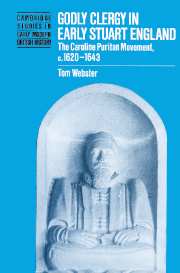Book contents
- Frontmatter
- Contents
- Acknowledgments
- List of abbreviations
- Introduction
- Part I Society, clerical conference and the Church of England
- Part II The godly ministry: piety and practice
- Part III ‘These uncomfortable times’: conformity and the godly ministers 1628–1638
- 7 Thomas Hooker and the conformity debate
- 8 Trajectories of response to Laudianism
- 9 The ecclesiastical courts and the Essex visitation of 1631
- 10 Juxon, Wren and the implementation of Laudianism
- 11 The diocese of Peterborough: a see of conflict
- 12 The metropolitical visitation of Essex and the strategies of evasion
- Part IV ‘These Dangerous Times’: the Puritan Diaspora 1631–1643
- Index
- Cambridge Studies in Early Modern History
12 - The metropolitical visitation of Essex and the strategies of evasion
Published online by Cambridge University Press: 04 November 2009
- Frontmatter
- Contents
- Acknowledgments
- List of abbreviations
- Introduction
- Part I Society, clerical conference and the Church of England
- Part II The godly ministry: piety and practice
- Part III ‘These uncomfortable times’: conformity and the godly ministers 1628–1638
- 7 Thomas Hooker and the conformity debate
- 8 Trajectories of response to Laudianism
- 9 The ecclesiastical courts and the Essex visitation of 1631
- 10 Juxon, Wren and the implementation of Laudianism
- 11 The diocese of Peterborough: a see of conflict
- 12 The metropolitical visitation of Essex and the strategies of evasion
- Part IV ‘These Dangerous Times’: the Puritan Diaspora 1631–1643
- Index
- Cambridge Studies in Early Modern History
Summary
For the godly ministers of Essex, the examples related by correspondence and word of mouth made Archbishop Laud's metropolitical visitation, imminent in Essex, an object of intense concern. A week ahead of the disciplinary circuit's return to the county, William Munning, a friend of Robert Ryece and minister of Good Easter, near Felsted, wrote to New England:
Wee have noe newes heere worth the relating, onely wee heare, that the Archbps Metropoliticall Visitation is (once againe) coming downe into this county. What effects it will produce I am not prophet sufficient infallibly to foretell: but (if wee may ghesse by the proceedings of Pope Regulus [Wren] in our next neighbour and native diocesse) it is to be feared that wee shall have more loste groates swept out of the house, instead of the duste, to the little laude of our good huswifery.
Perhaps some of this fear can be explained by the unfamiliarity of the metropolitical visitation: the provincial discipline was normally exercised as soon as practicable after the installation of a new archbishop, and there had not been such a visitation since 1613. However, Munning grounded his fears in what he knew of the proceedings in Norwich and, no doubt, in what was remembered of the diocese's last encounter with Laud.
The intervening period had been characterised by perhaps the worst possible combination of policy and practice. The public face of Juxon's episcopacy threatened the full vigour of Laudianism, while the application of his policy was sufficient to arouse hostility without being thorough enough to silence dissent.
- Type
- Chapter
- Information
- Godly Clergy in Early Stuart EnglandThe Caroline Puritan Movement, c.1620–1643, pp. 235 - 252Publisher: Cambridge University PressPrint publication year: 1997



